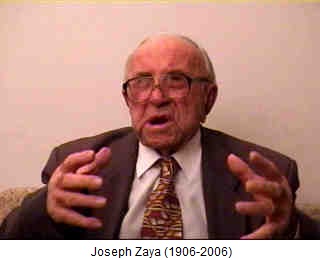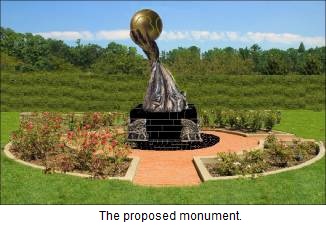

 (AINA) -- "We have made a clean sweep of the Armenians and Assyrians of Azerbaijan." Those were the words of Djevdet Bey, the governor of Van Province in Ottoman Turkey, who on April 24, 1915 lead 20,000 Turkish soldiers and 10,000 Kurdish irregulars in the opening act of the genocide of Assyrians, Armenians and Pontic Greeks. In three short years, 750,000 (75%) Assyrians would be killed, 1.5 million Armenians and 500,000 Greeks.
(AINA) -- "We have made a clean sweep of the Armenians and Assyrians of Azerbaijan." Those were the words of Djevdet Bey, the governor of Van Province in Ottoman Turkey, who on April 24, 1915 lead 20,000 Turkish soldiers and 10,000 Kurdish irregulars in the opening act of the genocide of Assyrians, Armenians and Pontic Greeks. In three short years, 750,000 (75%) Assyrians would be killed, 1.5 million Armenians and 500,000 Greeks.
Joseph Zaya (1906-2006) survived the genocide. He was born in a village in the Hakkary mountains (presently South-Eastern Turkey). The Ottoman Empire was something he lived in until the age of nine, when, in the face of genocide, he and his family was forced to flee. He remembered it vividly: long marches, hunger, starvation, butchery, impalement, burning.
"I lost my brother and his wife and four kids right in front of my eyes. Three Kurds and two Turks dragged my brother out and cut off his arms, right in front of me and his wife and kids. They then proceeded to rape his wife and eleven year old daughter, all the while looking at him and taunting him. After which they shot all of them. But they spared me. I don't know why."
"During our escape through the mountains," he continued, "I remember the bodies strewn on both sides of the path. Most women and children were crying but would not dare stop to care for the sick and dead because they knew the Turkish and Kurdish armies were behind them. I remember a child on the side of the road suckling on his already dead mother who had died with her arms around him. That image has haunted me all my life. This is something that we Assyrians should never forget, and the world should not forget it, either."
The genocide was recorded by Arnold Toynbee, famed British historian, as well as countless American and German missionaries. Toynbee's document runs for more than 600 pages and is entitled, "Arnold Toynbee Papers and Documents on the Treatment of Armenians and Assyrian Christians by the Turks, 1915-1916, in the Ottoman Empire and North-West Persia." The national archives of the British, French and American states contain a large collection of documents related to the genocide. The Diplomatic French archives, for example, included 45 volumes on the Assyrian question from 1915 to 1940.
No objective inquisitor can deny this horrific genocide occurred, the first of the twentieth century. Yet Turkey's official policy, which it pursues zealously, is to do exactly that. For Turkey, the genocide did not occur, what occurred was "civil strife." Turkey even goes as far as claim the Armenians mounted an insurrection and hence it was war and they were only casualties of war. This is not true, but even if it were, how would that explain the massacres of Assyrians and Greeks? They never rose against the Ottoman state. They remained loyal subjects until at last they realized their fate, and only then started literally defending their lives.
Ninety five years later, most of the world has come to accept that genocide was perpetrated by the Ottoman Turks. Even the Kurds, who did most of the actual killing during the genocide, have admitted it. On April 23, 1995 the Parliament of Kurdistan in Exile issued a statement saying "Let history note that we at the Parliament of Kurdistan in Exile share the pain of the survivors and their relations. We unequivocally denounce the act and condemn the perpetrators of this inhumanity, the Ottomans and their collaborators of the Kurdish auxiliary forces. We urge you all to do the same" (AINA 4-23-1995).
But Turkey still refuses to come to terms with its past. In November of 2000, an Assyrian priest from St. Mary's Syrian Orthodox Church in Diyarbakir, Turkey was arrested for affirming the Assyrian genocide of 1915. Fr. Yusuf was interviewed by reporters from the Turkish newspaper Hurriyet during deliberations in the U.S. Congress regarding HR 596, the Armenian Genocide Resolution. The reporters apparently had hoped to quote a Christian priest denying the validity of the Assyrian-Armenian-Greek Holocaust of 1915, but instead were angrily surprised by Fr. Yusuf's defiant affirmation. Fr. Yusuf's defiance has itself surprised those who have described him as an otherwise gentle and amicable man of faith. Following the interview, the Hurriyet reporters printed an inflammatory article with a photograph of Fr. Yusuf holding a cross under the headline "A Traitor Amongst Us" (AINA 11-23-2000).
 As recently as December 6, 2009 Turkey vigorously objected to the installation of an Assyrian Genocide monument in Fairfield, Australia. Turkey's Consul General in Australia, Mr. Renan Sekeroglu, expressed opposition to the erection of the monument and denied the genocide of Assyrians in World War One. Mr. Sekeroglu conceded there were "tragedies" on "both" sides during that period. The monument was subsequently approved (AINA 12-6-2009).
As recently as December 6, 2009 Turkey vigorously objected to the installation of an Assyrian Genocide monument in Fairfield, Australia. Turkey's Consul General in Australia, Mr. Renan Sekeroglu, expressed opposition to the erection of the monument and denied the genocide of Assyrians in World War One. Mr. Sekeroglu conceded there were "tragedies" on "both" sides during that period. The monument was subsequently approved (AINA 12-6-2009).
It is in the interest of Turkey to recognize the genocide and come to terms with it. For the Assyrian, Armenian and Greek communities, recognition of this mass murder is the most important thing. It is not about reparations. It is a simple need for acknowledgment of an unspeakable act.
In a terrible repeat of fate, it was another genocide of Assyrians, the 1933 Simmele massacre in north Iraq, that inspired famed genocide researcher Raphael Lemkin to coin the word "genocide." In 1933 Dr Lemkin was deeply disturbed by the massacre of Christian Assyrians by Iraqis. His distress was compounded by earlier memories of the slaughter of Armenians by Turks during the First World War and the international jurist began to examine these acts as crimes in an effort to deter and prevent them. He presented his first proposal to outlaw such 'acts of barbarism' to the Legal Council of the League of Nations in Madrid the same year (AINA 1-16-2007).
On March 4, 2010 the U.S. House Foreign Affairs Committee voted to condemn as genocide the mass killings of Armenians. Turkey recalled its ambassador. Vahe Magarian of Cincinnati, Ohio, sent a pointed letter to the New York Times, suggesting that Turkey's recalled Ambassadors, "rather than flying home, should be made to march home on foot. Forced marches were the preferred means of travel during the dying days of the Ottoman Empire." Prominent Turkish commentator Can Dundar wrote an article titled: "Are we going to recall all our Ambassadors?" He stated that, at this rate, by the time the 100th anniversary of the Armenian Genocide rolls around in 2015, there won't be a single country left not accusing Turkey of genocide. Isn't it about time that we search out what dirty work our fathers did 95 years ago? Shouldn't we ask what did we do wrong? Dundar implored (AINA 3-16-2010).
On March 11, 2010 the Swedish parliaments voted for recognition of the Genocide of Assyrians, Pontic Greeks and Armenians (AINA 3-12-2010). The Genocide has been recognized by over 20 other countries but in those it has always been the "Armenian Genocide," but in Sweden the Assyrians and the Pontic Greeks were mentioned as victims of the horrifying massacres. This caused major diplomatic crises between Sweden and Turkey. The Turkish ambassador was recalled, the Swedish prime minister, Fredrik Reinfeldt, called Turkey's Recep Erdogan and apologized for the vote. The Swedish minister of foreign affairs, Carl Bildt, called the vote "sad and stupid." Suddenly Swedish democracy was forgotten by the leaders. The Turkish government took its chances and started a huge campaign, including threats against Assyrians and Armenians. The Assyrian Federation in Sweden fought back by publishing an interview from 2006 with Reinfeldt, where he says that he would fight for recognition of the Genocide were he elected prime minister.
It all became very embarrassing for the Swedish and Turkish governments and just two weeks after what made headlines in a lot of the international media outlets all was forgotten and the Turkish ambassador was back in Stockholm. This shows that Turkey knows that it doesn't work to threaten the Assyrians.
It also gives strength to Joseph Zaya and other eyewitnesses -- they and their families will never be forgotten.

or register to post a comment.